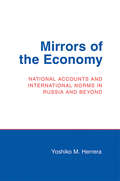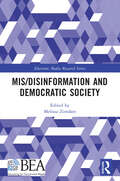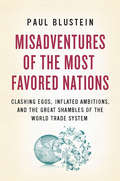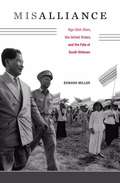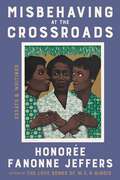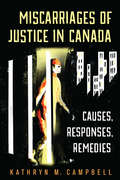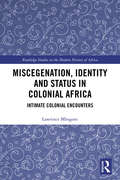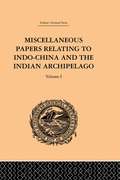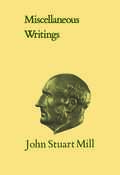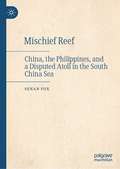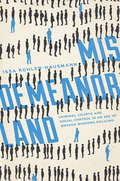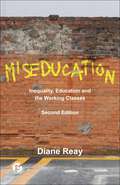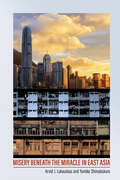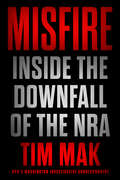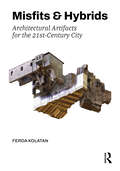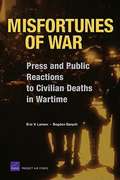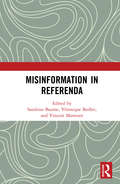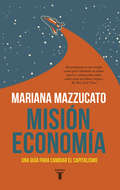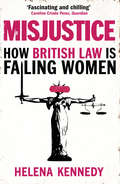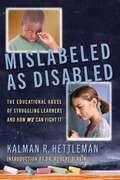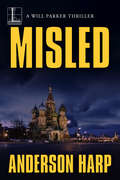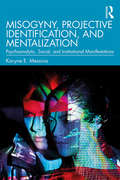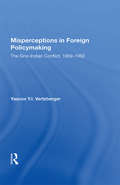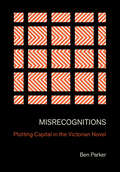- Table View
- List View
Mirrors of the Economy: National Accounts and International Norms in Russia and Beyond (Cornell Studies in Political Economy)
by Yoshiko M. HerreraAs international institutions multiply and more governments sign on to standardized ways of organizing economies and societies, resistance to globalization persists. In Mirrors of the Economy, Yoshiko M. Herrera explores the variance in implementation of international institutions through an examination of the international System of National Accounts (SNA) and, in particular, the success of post-Soviet Russia and other formerly communist countries in implementing the SNA. The SNA is the basis for all national economic indicators, including Gross Domestic Product, and is therefore a critical institution for economic policy and development. Herrera tests existing theories of implementation of international institutions and proposes a novel theoretical concept, "conditional norms," to suggest that the conditions attached to norms may result in institutional change. On the basis of content analysis of statistical publications and more than seventy-five interviews throughout Russia—particularly in Moscow—and in Washington, she forms a clear picture of the implementation of the SNA in Russia in the early 1990s. In Soviet times a stable conditional norm delineated the appropriateness of statistical institutions based on the structure of the economy. The transformation of the economic system triggered a shift in support among Russian and Eastern European statisticians in favor of the SNA. Herrera's argument increases our understanding of the role of norms, structural conditions, and professional communities in institutional implementation.
Mis/Disinformation and Democratic Society (Electronic Media Research Series)
by Melissa ZimdarsDrawing on a variety of perspectives and methodologies, this collection explores the intricate relationship between mis- and disinformation and the functioning of democratic society.This book seeks to show how mis- and disinformation is destabilizing our collective confidence in institutions fundamental to the functioning of democratic society, including our electoral processes, our perceptions of trust in government officials and institutions, our healthcare, education, economic, and media systems; and even our communities and interpersonal relationships. Topics covered in this book include the role of Artificial Intelligence in automating deception; how financial crises and journalistic norms in the news industry create favorable conditions for the amplification and laundering of political disinformation; and how our emotional states impact our susceptibility to misinformation. Throughout, the authors provide nuanced definitions of key terms such as “conspiracy theory” and “digital democracy” which help level the field for future research.Mis/Disinformation and Democratic Society is recommended reading for researchers and advanced scholars in this dynamic area of study.
Misadventures of the Most Favored Nations: Clashing Egos, Inflated Ambitions, and the Great Shambles of the World Trade System
by Paul BlusteinAn acclaimed expert on the global economy illuminates the human foibles, hidden agendas, and political follies that threaten the end of the globalization movement
Misalliance
by Edward MillerIn the annals of Vietnam War history, no figure has been more controversial than Ngo Dinh Diem. During the 1950s, U. S. leaders hailed Diem as “the miracle man of Southeast Asia” and funneled huge amounts of aid to his South Vietnamese government. But in 1963 Diem was ousted and assassinated in a coup endorsed by President John F. Kennedy. Diem’s alliance with Washington has long been seen as a Cold War relationship gone bad, undone either by American arrogance or by Diem’s stubbornness. In Misalliance, Edward Miller provides a convincing new explanation for Diem’s downfall and the larger tragedy of South Vietnam. For Diem and U. S. leaders, Miller argues, the alliance was more than just a joint effort to contain communism. It was also a means for each side to pursue its plans for nation building in South Vietnam. Miller’s definitive portrait of Diem-based on extensive research in Vietnamese, French, and American archives-demonstrates that the South Vietnamese leader was neither Washington’s pawn nor a tradition-bound mandarin. Rather, he was a shrewd and ruthless operator with his own vision for Vietnam’s modernization. In 1963, allied clashes over development and reform, combined with rising internal resistance to Diem’s nation building programs, fractured the alliance and changed the course of the Vietnam War. In depicting the rise and fall of the U. S. –Diem partnership, Misalliance shows how America’s fate in Vietnam was written not only on the battlefield but also in Washington’s dealings with its Vietnamese allies.
Misbehaving at the Crossroads: Essays & Writings
by Honoree Fanonne JeffersThe New York Times-bestselling, National Book Award-nominated author of The Love Songs of W.E.B. Du Bois and The Age of Phillis makes her nonfiction debut with this personal and thought-provoking work that explores the journeys and possibilities of Black women throughout American history and in contemporary times. Honorée Fanonne Jeffers is at a crossroads.Traditional African/Black American cultures present the crossroads as a place of simultaneous difficulty and possibility. In contemporary times, Kimberlé Crenshaw coined the phrase “intersectionality” to explain the unique position of Black women in America. In many ways, they are at a third crossroads: attempting to fit into notions of femininity and respectability primarily assigned to White women, while inventing improvisational strategies to combat oppression.In Misbehaving at the Crossroads, Jeffers explores the emotional and historical tensions in Black women’s public lives and her own private life. She charts voyages of Black girlhood to womanhood and the currents buffeting these journeys, including the difficulties of racially gendered oppression, the challenges of documenting Black women’s ancestry; the adultification of Black girls; the irony of Black female respectability politics; the origins of Womanism/Black feminism; and resistance to White supremacy and patriarchy. As Jeffers shows with empathy and wisdom, naming difficult historical truths represents both Blues and transcendence, a crossroads that speaks.Necessary and sharply observed, provocative and humane, and full of the insight and brilliance that has characterized her poetry and fiction, Misbehaving at the Crossroads illustrates the life of one extraordinary Black woman—and her extraordinary foremothers.
Miscarriages of Justice in Canada: Causes, Responses, Remedies
by Kathryn CampbellInnocent people are regularly convicted of crimes they did not commit. A number of systemic factors have been found to contribute to wrongful convictions, including eyewitness misidentification, false confessions, informant testimony, official misconduct, and faulty forensic evidence. In Miscarriages of Justice in Canada, Kathryn M. Campbell offers an extensive overview of wrongful convictions, bringing together current sociological, criminological, and legal research, as well as current case-law examples. For the first time, information on all known and suspected cases of wrongful conviction in Canada is included and interspersed with discussions of how wrongful convictions happen, how existing remedies to rectify them are inadequate, and how those who have been victimized by these errors are rarely compensated. Campbell reveals that the causes of wrongful convictions are, in fact, avoidable, and that those in the criminal justice system must exercise greater vigilance and openness to the possibility of error if the problem of wrongful conviction is to be resolved.
Miscegenation, Identity and Status in Colonial Africa: Intimate Colonial Encounters (Routledge Studies in the Modern History of Africa)
by Lawrence MbogoniThroughout the nineteenth and early twentieth centuries the colonial administrations in British East-Central African colonies considered inter-racial sexual liaisons to be a serious and recurrent "problem". Consequently, inter-racial sexual liaisons (concubinage and marriage) and the mixed race progeny that resulted from these liaisons led to protracted discussions and enactment of policies which addressed questions about concubinage, marriage, racial identity, sexual morality, and the status of persons of mixed race in British East-Central Africa. Using archival sources and secondary literature, the author highlights how colonial inter-racial intimate encounters became intertwined with conceptions of ‘race’ and what it meant to be European, African ("native") and racially mixed. Intended for students and scholars interested in the study of ‘race’ and sexuality in colonial Africa, the book will provide an understanding of why inter-racial liaisons despite of rigid racial barriers were not easy to legislate against.
Miscellaneous Papers Relating to Indo-China and the Indian Archipelago: Volume I (Trubner's Oriental Ser.)
by Reinhold RostFirst Published in 2000. Routledge is an imprint of Taylor & Francis, an informa company.
Miscellaneous Writings
by John Stuart Mill John RobsonThe interests and activities of John Stuart Mill (1806-73) were so wide-ranging that even the varied subjects of thirty previously published volumes of Collected Works cannot encompass them all. In this volume are brought together diverse and interesting instances of his polymathic career, none before republished and some previously unpublished.Neatly framing Mill's writing career are his editorial prefaces and extensive notes to Jeremy Bentham;s Rationale of Judicial Evidence (1827) and James Mill's Analysis of the Phenomena of the Human Mind (1869). Both demonstrate his extraordinary powers of mind and diligence as well as his fealty. His constant avocation, field botany, is shown in his botanical writings, which open a window on an almost unknown activity that sustained and delighted him. Brief comments on two medical works hint at another interest. Two articles of which he was co-author demonstrate his work as editor of the London and Westminster Review, and a calendar of his contributions to the Political Economy Club provides yet another glimpse into his chosen activities and concerns. Published for the first time are Mill's English and French wills, providing still further biographical detail.
Mischief Reef: China, the Philippines, and a Disputed Atoll in the South China Sea
by Senan FoxThis seven-chapter book examines the background to and consequences of the disputed occupation of Mischief Reef in the Spratly Islands group of the South China Sea (SCS) by the People’s Republic of China (PRC), from the mid-1990s to the present day. Although Mischief Reef has received significant media attention and has been discussed in academic journal articles and policy research reports, no books on the topic have appeared since a 30-page publication in 1996. By covering the topic in historical, domestic political, legal, economic, strategic, and geo-political terms, this book not only fills a gap on a particularly important issue with global consequences, but also acts as a follow-on to a previous Palgrave book by this author on another maritime dispute, Socotra Rock. This book will be of interest to journalists, scholars and legal theorists researching the implications of China's rise for maritime disputes in East Asia.
Misdemeanorland: Criminal Courts and Social Control in an Age of Broken Windows Policing
by Issa Kohler-HausmannAn in-depth look at the consequences of New York City’s dramatically expanded policing of low-level offensesFelony conviction and mass incarceration attract considerable media attention these days, yet the most common criminal-justice encounters are for misdemeanors, not felonies, and the most common outcome is not prison. In the early 1990s, New York City launched an initiative under the banner of Broken Windows policing to dramatically expand enforcement against low-level offenses. Misdemeanorland is the first book to document the fates of the hundreds of thousands of people hauled into lower criminal courts as part of this policing experiment.Drawing on three years of fieldwork inside and outside of the courtroom, in-depth interviews, and analysis of trends in arrests and dispositions of misdemeanors going back three decades, Issa Kohler-Hausmann argues that lower courts have largely abandoned the adjudicative model of criminal law administration in which questions of factual guilt and legal punishment drive case outcomes. Due to the sheer volume of arrests, lower courts have adopted a managerial model--and the implications are troubling. Kohler-Hausmann shows how significant volumes of people are marked, tested, and subjected to surveillance and control even though about half the cases result in some form of legal dismissal. She describes in harrowing detail how the reach of America's penal state extends well beyond the shocking numbers of people incarcerated in prisons or stigmatized by a felony conviction.Revealing and innovative, Misdemeanorland shows how the lower reaches of our criminal justice system operate as a form of social control and surveillance, often without adjudicating cases or imposing formal punishment.
Miseducation: Inequality, Education and the Working Classes (21st Century Standpoints)
by Diane ReayEducation is supposed to level the playing field, and yet for many working-class children inequalities in the classroom in fact deepen the divide. Students from disadvantaged backgrounds are almost four times more likely to be excluded from school than their wealthier peers and many are struggling in an educational environment increasingly concerned with discipline. In this substantially revised and updated edition of her bestselling book, Diane Reay – herself working class turned Cambridge professor – investigates why we educate social classes so differently. Drawing on extensive interviews with working class children and young people, Miseducation offers a sharp critique of how class identity, social mobility, and entrenched inequalities shape educational outcomes. It also examines the increasing focus on control and discipline in UK schools and charts the impact of policies like academies on working-class students. In a new chapter, Reay draws lessons from educational systems around the world, while a second presents clear recommendations for creating a system that supports every child’s potential. Insightful and thought-provoking, this book is essential reading for anyone invested in the future of education and social equity.
Misery beneath the Miracle in East Asia (Studies of the Weatherhead East Asian Institute, Columbia University)
by Arvid J. Lukauskas Yumiko ShimabukuroMisery beneath the Miracle in East Asia challenges prevailing views of the East Asian economic miracle. Existing scholarship has overlooked the severity, persistence, and harmful consequences of the social-welfare crises affecting the region. Arvid J. Lukauskas and Yumiko Shimabukuro fill this gap and put a major asterisk on East Asia's economic record. Combining big-picture analysis, abundant data, a dynamic interdisciplinary framework, and powerful human stories, they shed light on the social ills that governments have failed to address adequately, including low wages, child abuse, elderly poverty, and substandard housing. One of the major forces behind the multidimensional welfare crises is the region's productivist welfare strategy, which prioritizes economic growth while abandoning a robust social safety net, leaving the most vulnerable segments of society largely unprotected. Misery beneath the Miracle in East Asia brings the region into debates over the dangers of seeking growth at all costs that are currently embroiling the United States and other advanced industrialized countries.
Misfire: Inside the Downfall of the NRA
by Tim MakA blistering exposé of the National Rifle Association, revealing its people, power, corruption, and ongoing downfall, from acclaimed NPR investigative reporter Tim Mak The NRA once compelled respect—even fear—from Republicans and Democrats alike. Once a grassroots club dedicated to gun safety, the NRA ballooned into a powerful lobbyist organization that maintained an iron hold on gun legislation in America. This influential nonprofit raised millions in small fees from members across the country, which funded hidden, lavish lifestyles of designer suits, private jets and yachts, martini lunches and Champagne dinners—while the group manipulated legislators and flirted with a Russian spy. Yet in 2012, the NRA&’s grip on Washington began to loosen in the wake of the massacre at Sandy Hook Elementary. Facing nationwide outrage, NRA CEO Wayne LaPierre gave a speech claiming the solution was not fewer guns, but more guns, in schools. The group&’s rhetoric only escalated from there, a misstep that sparked a backlash and invited the scrutiny of the government. Unveiled here for the first time ever are surprising, revelatory details spotlighting decades of poor leadership and mismanagement by LaPierre; the NRA&’s long association with marketing firm Ackerman-McQueen; NRA executives&’ 2015 trip to Moscow, a by-invitation affair packed with meetings with Russian government officials, diplomats, and oligarchs seeking influence in American politics; as well as the power struggle between LaPierre and former NRA president Oliver North that fractured the organization. Misfire is the result of a four-year investigation by journalist Tim Mak, who scoured thousands of pages of never-before-publicized documents and cultivated dozens of confidential sources inside the NRA's orbit to paint a vivid picture of the gun group's rampant corruption and slow decline, marking a sea change in the battle over gun rights and control in America.
Misfits & Hybrids: Architectural Artifacts for the 21st-Century City
by Ferda KolatanContemporary cities are shaped by the unlikely adjacencies of objects that are vastly different in kind, origin, and scale: buildings, infrastructure, and other urban components that over time accumulate into mismatched configurations. However, despite the ubiquity of these oddities and their impact on the city, we rarely give them much consideration. In Misfits & Hybrids, Ferda Kolatan explores the untapped potential in these unexpected conditions for a new kind of architecture. A diverse array of projects, developed in Kolatan’s design studios at the University of Pennsylvania Weitzman School of Design, illustrates how hybrid artifacts can reveal the often overlooked cultural, socio-political, and material histories of a site, fostering design tactics invested in reinventing the existing. Set within the cosmopolitan megacities of Istanbul, Cairo, and New York, the projects are conceived as real fictions, conjuring novel narrative, aesthetic, and representational forms to reflect the pluralistic postindustrial city.
Misfortunes of War: Press and Public Reactions to Civilian Deaths in Wartime
by Eric V. Larson Bogdan SavychThis monograph, part of a larger study of ways to reduce collateral damage undertaken for the U.S. Air Force, analyzes media and public reactions to civilian casualty incidents, whether these incidents affect media reporting or public support for military operations, and, if so, how. It analyzes case studies of incidents of civilian deaths in the February 1991 bombing of the Al Firdos bunker in the Gulf War, the April and May 1999 attacks on the Djakovica convoy and Chinese embassy during the war in Kosovo, the June 2002 attack involving an Afghan wedding party during operations in Afghanistan, and the March 2003 incident involving a large explosion in a crowded Baghdad marketplace to describe and explain how the U.S. and foreign media and publics have responded. For each case study, the study team examined press, public, and leadership responses to these incidents and found the following. First, while avoiding civilian casualties is important to the American public, it has realistic expectations about the actual possibilities for avoiding casualties. Second, the press reports heavily on civilian casualty incidents. Third, adversaries understand the public's sensitivities to civilian deaths and have sought to exploit them. Fourth, during armed conflict, the belief that the United States and its allies are trying to avoid casualties most affects support for U.S. military operations, both at home and abroad. Fifth, while strong majorities of Americans typically give U.S. military and political leaders the benefit of the doubt when civilian casualty incidents occur, this does not necessarily extend to foreign audiences. Sixth, when civilian casualty incidents occur, it is at least as important to get the story right as to get the story out. Finally, attention to and concern about civilian casualties both at home and abroad have increased in recent years and may continue to do so.
Misinformation in Referenda
by Sandrine Baume Véronique Boillet Vincent MartenetThe book identifies the impact of misinformation in the context of referenda. While the notion of misinformation is at the centre of current events and is the subject of several studies, it has rarely been addressed in the context of referenda or from a multidisciplinary and comparative perspective. This book fills this gap. Different legal orders have been chosen because of their extensive referendum practices (California and Switzerland); a recent legislative process on the issue of misinformation (Germany, France, and Canada); or recent experience with a vote during which it was considered that false information had been disseminated (Brexit, Catalan independence, and Italian constitutional referendum of 2016). By bringing together authors from the political and legal sciences, the book focuses on combining the expertise of researchers from different backgrounds and origins in order to propose innovative solutions. In this regard, the book is characterized by the fact that it does not aim to combat misinformation per se, but develops suggestions meant to guarantee the conditions of formation of the political will during referenda. The book will be an invaluable resource for legal scholars, political scientists, and specialists of political communication. Outside the world of academia, the book may draw the attention of policy-makers, practitioners, and journalists confronted with the challenges of misinformation or disinformation.
Misión economía: Una guía para cambiar el capitalismo
by Mariana Mazzucato¿Y si aplicáramos a nuestros problemas actuales el espíritu, la audacia y los medios que nos llevaron a la Luna? Una crítica contundente y muy necesaria del capitalismo moderno en la que la galardonada economista internacional sostiene que, para resolver las crisis a las que nos enfrentamos, debemos ser innovadores. Llegar a la Luna fue un extraordinario logro que requirió nuevas formas de colaboración entre los sectores público y privado, un altísimo nivel de compromiso y coordinación y la aceptación de riesgos y gastos muy elevados para alcanzar una meta a largo plazo. Inspirándose en las misiones del programa lunar, Mazzucato propone que se aplique ese mismo nivel de innovación a una serie de objetivos sociales, económicos y políticos clave con el fin de salir de nuestro estancamiento rumbo a un futuro más optimista. El capitalismo lleva tiempo paralizado y no ofrece respuestas a nuestros mayores problemas, como las epidemias, la desigualdad y la crisis ambiental. Se impone la necesidad de repensar el papel de los Estados en la economía y la sociedad, de orientar los presupuestos al largo plazo y de recuperar el sentido del interés público. Misión economía, cuyas ideas ya se están adoptando en todo el mundo, propone fijarse unos objetivos inspiradores e ilusionantes, entre los que se incluyen una prosperidad ampliamente compartida, unos servicios públicos de calidad para todos y una solución a la crisis climática. Según Mazzucato, los Estados pueden afrontar grandes desafíos y misiones ambiciosas, y su visión ofrece una salida a nuestro inmovilismo hacia un futuro más optimista. La crítica ha dicho...«Su propuesta es tan amplia como poco habitual: un nuevo relato convincente sobre cómo crear un futuro deseable.»The New York Times «Su defensa de un nuevo enfoque es abrumadora. Nos contagia con el tipo devisión, ambición e imaginación que tan desesperadamente necesitamos hoy.»The Guardian «Una visión oportuna y optimista. Aunque presenta sus argumentos de manera tan clara que pueden parecer obvios, lo cierto es que son revolucionarios.»Nature «Mazzucato sostiene que las sociedades deben abjurar de ideologías agotadas y adoptar el enfoque político que llevó a los astronautas en la Luna. Convincente y fascinante.»The Economist «Mazzucato critica la pobreza de la idea de que el único papel del gobierno es corregir las "fallas del mercado". Aboga por un sector público capaz de adaptarse a circunstancias cambiantes y nuevos desafíos.»Prospect «Mazzucato propone rediseñar el capitalismo a favor de las partes interesadas más que de los accionistas.»The Times «Desde 1969 nos preguntamos cómo los humanos pudieron llegar a la Luna y no logran resolver los problemas apremiantes aquí en la Tierra. Mariana Mazzucato ofrece la respuesta.»Financial Times «Una de las más ágiles pensadoras post-Brexit.»The Daily Mail «Según Mazzucato, años de privatizar empresas estatales y subcontratar servicios esenciales han dejado a los gobiernos debilitados e incapaces de beneficiar a la sociedad. Es el momento de que respalden objetivos audaces.»Reuters
Misjustice: How British Law is Failing Women
by Helena KennedyTwo women a week are killed by a spouse or partner. Every seven minutes a woman is raped. Now is the time for change.‘Fascinating and chilling’ Caroline Criado Perez, bestselling author of Invisible Women Helena Kennedy, one of our most eminent lawyers and defenders of human rights, examines the pressing new evidence that women are being discriminated against when it comes to the law. From the shocking lack of female judges to the scandal of female prisons and the double discrimination experienced by BAME women, Kennedy shows with force and fury that change for women must start at the heart of what makes society just. ‘An unflinching look at women in the justice system… an important book because it challenges acquiescence to everyday sexism and inspires change’ The Times
Mislabeled as Disabled: The Educational Abuse of Struggling Learners and How WE Can Fight It
by Kalman R. HettlemanKalman R. &“Buzzy&” Hettleman exposes the educational abuse suffered by tens of millions of struggling learners, including many who are &“Mislabeled as Disabled&” and dumped into special education. The majority of these students are not disabled in any medical or other clinical sense. Rather, in violation of federal law, they fail to receive proper instruction and fall farther behind, suffering stigma and segregation. Hettleman also shows how teachers are undervalued heroes denied the teaching tools to do the job right and, like students, are victimized by the system. This book is a call to everyone to become enraged, and then engaged in the struggle for reform.
Misled: A Pulse-Pounding International Thriller (A Will Parker Thriller #4)
by Anderson Harp&“A stunner—It reminds me of Tom Clancy at his finest.&”—James Rollins, New York Times bestselling author on Retribution The greatest thriller authors alive have praised Anderson Harp&’s books as riveting, authentic thrillers. Now read for yourself: a prescient novel of interference with American lives as Russia targets the CDC… Marine recon veteran and small-town prosecutor Will Parker became a bush pilot for two reasons: a love of flying, and Dr. Karen Stewart. Years ago in Somalia, Will saved the dedicated CDC researcher&’s life. Now he may have to do it again, under even more challenging conditions. Two Marines have died under suspicious circumstances, and Will is the only person who can get to the truth. Even if it means an off-the-books mission that will take him thousands of miles away to remote Russia. Both of the dead had in common a fellow student at the Maryland Cyber Security Center. He&’s missing, but his trail leads Will to a small village outside Moscow known for worldwide hacking—and ultimately to an American financial institution with a shady multi-trillion-dollar secret to which the Marines and their classmate held the key. That key compelled certain executives to unleash killers to ensure its concealment . . . Because of her importance to Will, Dr. Karen Stewart is once again a target. The enemy knows if they get to her, they get to him. Now, with her research taking her into the far-flung Yukon, Parker&’s arctic-combat training and skills as a bush pilot will be his only hope of saving her, not to mention himself . . . "The scariest story is the true story. Here's the real intelligence operation. Harp knows his stuff" —Brad Meltzer on Retribution&“Tense and authentic—reading this book is like living a real life mission.&”—Lee Child on Retribution&“Outstanding thriller with vivid characters, breakneck pacing, and suspense enough for even the most demanding reader. Harp writes with complete authenticity and a tremendous depth of military knowledge. A fantastic read—don&’t miss it!&”—Douglas Preston, #1 bestselling author on Retribution &“Harp brings his considerable military expertise to a global plot that&’s exciting, timely, and believable . . . —David Morrell, New York Times bestselling author on Retribution. &“Retribution is a stunner: a blow to the gut and shot of adrenaline. Here is a novel written with authentic authority and bears shocking relevance to the dangers of today. It reminds me of Tom Clancy at his finest.&”—James Rollins, New York Times bestselling author of Bloodline
Misled: A Pulse-Pounding International Thriller (A Will Parker Thriller)
by Anderson Harp&“A stunner—It reminds me of Tom Clancy at his finest.&”—James Rollins, New York Times bestselling author on Retribution The greatest thriller authors alive have praised Anderson Harp&’s books as riveting, authentic thrillers. Now read for yourself: a prescient novel of interference with American lives as Russia targets the CDC… Marine recon veteran and small-town prosecutor Will Parker became a bush pilot for two reasons: a love of flying, and Dr. Karen Stewart. Years ago in Somalia, Will saved the dedicated CDC researcher&’s life. Now he may have to do it again, under even more challenging conditions. Two Marines have died under suspicious circumstances, and Will is the only person who can get to the truth. Even if it means an off-the-books mission that will take him thousands of miles away to remote Russia. Both of the dead had in common a fellow student at the Maryland Cyber Security Center. He&’s missing, but his trail leads Will to a small village outside Moscow known for worldwide hacking—and ultimately to an American financial institution with a shady multi-trillion-dollar secret to which the Marines and their classmate held the key. That key compelled certain executives to unleash killers to ensure its concealment . . . Because of her importance to Will, Dr. Karen Stewart is once again a target. The enemy knows if they get to her, they get to him. Now, with her research taking her into the far-flung Yukon, Parker&’s arctic-combat training and skills as a bush pilot will be his only hope of saving her, not to mention himself . . . "The scariest story is the true story. Here's the real intelligence operation. Harp knows his stuff" —Brad Meltzer on Retribution&“Tense and authentic—reading this book is like living a real life mission.&”—Lee Child on Retribution&“Outstanding thriller with vivid characters, breakneck pacing, and suspense enough for even the most demanding reader. Harp writes with complete authenticity and a tremendous depth of military knowledge. A fantastic read—don&’t miss it!&”—Douglas Preston, #1 bestselling author on Retribution &“Harp brings his considerable military expertise to a global plot that&’s exciting, timely, and believable . . . —David Morrell, New York Times bestselling author on Retribution. &“Retribution is a stunner: a blow to the gut and shot of adrenaline. Here is a novel written with authentic authority and bears shocking relevance to the dangers of today. It reminds me of Tom Clancy at his finest.&”—James Rollins, New York Times bestselling author of Bloodline
Misogyny, Projective Identification, and Mentalization: Psychoanalytic, Social, and Institutional Manifestations
by Karyne E. MessinaMisogyny, Projective Identification, and Mentalization looks at how the psychoanalytic concepts of projective identification and mentalization may explain the construction of society and how they have enabled misogyny to be expressed in social, political, and institutional settings. Karyne E. Messina explores how misogyny has affected the perception and treatment of women through analysis of a range of examples of individual women and groups. The first part explores projective identification as a mechanism for the suppression of women, looking at the origins of the concept in psychoanalysis and its expansion. The author examines the story of Clara Thompson as an example, arguing that her virtual disappearance from the history of psychiatry and psychoanalysis itself is a telling example of this process at work. The second part of the book uses four examples of individuals, including the recent election loss by Hillary Clinton in 2016, to show that projective identification can (particularly in political and cultural settings) overtake and motivate groups as well as individuals, and lead to violence, atrocity, humiliation, and dismissal of and against women. Part three then features case studies of four groups of women from the 20th century, including victims of the 1994 Rwandan genocide, showing how projective identification against groups has occurred. With specific reference to the erasure of women’s contributions in society, both individually and collectively, and the trauma that arises from the many effects of regarding women as a group as "less" or "other", this is a book which sets a new agenda for understanding how misogyny is expressed socially. Misogyny, Projective Identification, and Mentalization will be of interest to psychoanalysts and psychoanalytic psychotherapists as well as scholars of politics, gender, and cultural studies.
Misperceptions In Foreign Policymaking: The Sino-indian Conflict 1959-1962
by Yaacov Y.I. VertzbergerIn this case study of the Sino-Indian conflict between 1959 and 1962, the author explores the attitudes that shaped India's policy toward China and traces the network of misunderstandings that led to a war unwanted by both sides.
Misrecognitions: Plotting Capital in the Victorian Novel
by Ben ParkerMisrecognitions mounts a vigorous defense of the labyrinthine plotting of Victorian novels, notorious for their implausible concluding revelations and coincidences. Critics have long decried Victorian recognition scenes—the reunions and retroactive discoveries of identity that too conveniently bring the story to a close—as regrettable contrivances. Ben Parker counters this view by showing how these recognition scenes offer a critique of the social and economic misrecognitions at work in nineteenth-century capitalism. Through a meticulous analysis of novels by Charles Dickens, Anthony Trollope, and Henry James, as well as Arthur Conan Doyle's Sherlock Holmes stories, Misrecognitions tracks how the Victorian novel translates the financialized abstractions of capital into dramas of buried secrets and disguised relations. Drawing on Karl Marx's account of commodity fetishism and reification, Parker contends that, by configuring capital as an enigma to be unveiled, Victorian recognition scenes dramatize the inversions of agency and temporality that are repressed in capitalist production. In plotting capital as an agent of opacity and misdirection, Victorian novels and their characteristic dialectic of illusion and illumination reveal the plot hole in capitalism itself.
